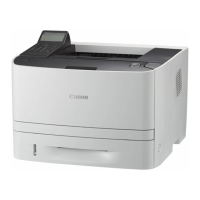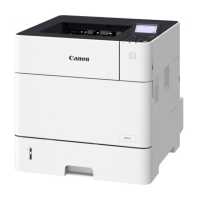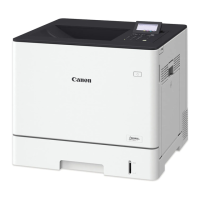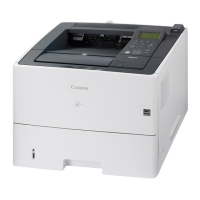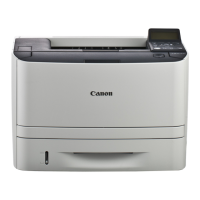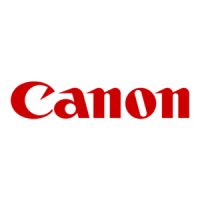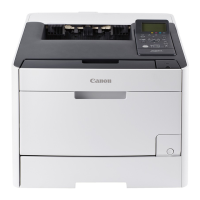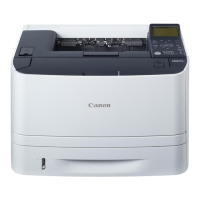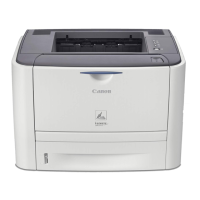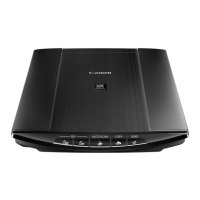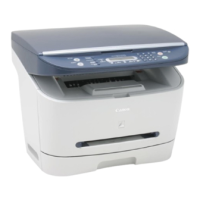Do you have a question about the Canon LBP253 Series and is the answer not in the manual?
Precautions for safe and comfortable use of the machine, including location and warnings.
Information about voltage, frequency, and safe use of the power cord and outlet.
Precautions for safe operation, including warnings about heat, moving the machine, and electrical shock.
Procedures for cleaning the machine, checking components, and safety during maintenance.
Warnings and precautions regarding toner cartridges, including handling, storage, and disposal.
Description of exterior and interior parts, operation panel keys, and display functions.
Instructions on operating the touch-panel display, including tap, long touch, and flick gestures.
Instructions on loading paper into the paper drawer or multi-purpose tray.
How to save energy by entering sleep mode or setting auto shutdown times.
Steps to print a document from a computer using the printer driver.
Procedures for canceling print jobs from a computer or the operation panel.
Overview of various print settings available, such as enlargement/reduction and 2-sided printing.
How to print documents securely by setting a PIN to prevent unauthorized access.
Instructions for printing files directly from a USB memory device without a computer.
Methods for connecting the machine to a mobile device via wireless LAN, Direct Connection, or NFC.
How to operate the machine remotely using a Web browser on a mobile device.
Steps to connect the machine to a wired or wireless LAN, including IP address settings.
Configuring unique network IP addresses (IPv4 and IPv6) for the machine.
Setting communication mode (half/full duplex) and Ethernet type.
Configuring DNS, mDNS, or DHCP options for name resolution.
Measures to prevent unauthorized access using user privileges, firewalls, and port changes.
Assigning user access privileges (System Manager ID, Department ID, Remote UI PIN) to control machine access.
Using packet filters to restrict communication based on specified IP or MAC addresses.
Features to protect important information from network attacks like sniffing and tampering.
Blocking unauthorized network access by managing user authentication information.
Steps to start the Remote UI by entering the machine's IP address into a Web browser.
Checking current print job status, history, errors, consumables, and device specifications.
Saving machine settings to a computer (export) or loading saved data (import).
Specifying paper size, type, registering custom sizes, and limiting displayed sizes.
List of all network-related settings, including wired/wireless LAN, TCP/IP, and security configurations.
Various settings related to print quality, layout, and specific printer languages (PCL, PS, UFR II).
Settings for network configuration, NFC, system manager info, security, and initialization.
Step-by-step instructions for removing paper jams from various locations within the machine.
Troubleshooting steps for common error messages displayed on the screen.
Solutions for specific three-digit error codes that appear during operation.
Causes and solutions for paper creasing or curling during printing.
Troubleshooting steps for issues where paper is not fed correctly or multiple sheets are fed.
Information to provide when contacting Canon support for unresolved problems.
Procedures for cleaning the exterior, ventilation slots, and internal fixing units.
Procedures and messages related to replacing toner cartridges, including using up toner.
Adjustments for print density and print position to improve output quality.
Printing various reports like consumables status, user data, and IPSec policy lists.
Restoring settings to factory defaults, including menu, key/certificate, and network settings.
Overview of features grouped into "Going Green," "Improving Efficiency," and "So Much More."
Features and tips for saving paper and energy, such as 2-sided printing and sleep mode.
Features that help save time and improve workflow, like USB printing and Remote UI management.
Technical details of the machine, including specifications, wireless LAN, paper support, and consumables.
Detailed specifications of the machine's type, printing method, resolution, speed, power, and environmental requirements.
Information on supported paper sizes, types, and capacities for different paper sources.
Details about estimated replacement times for consumables like toner cartridges and their yields.
Information about optional items like the Paper Feeder Unit PF-44.
Instructions on how to print directly from Apple devices using AirPrint.
How to set up and use Google Cloud Print for printing from various devices.
List of included manuals such as Getting Started, Wireless LAN Setting Guide, and e-Manual.
Instructions on how to find topics, search, and view the e-Manual.
Instructions on common Windows operations like displaying computer folders and enabling network discovery.
Information on third-party services, product name, EMC requirements, and laser safety.
| Print Speed | Up to 30 ppm (A4) |
|---|---|
| Print Resolution | Up to 1200 x 1200 dpi |
| Duplex Printing | Yes |
| Print Resolution (Black) | Up to 1200 x 1200 dpi |
| Type | Laser Printer |
| Paper Input (Standard) | 250 sheets |
| Interface | USB 2.0, Ethernet |
| Functions | |
| Paper Capacity | 250 sheets |
| Connectivity | USB 2.0, Ethernet |
| Operating System Compatibility | Windows, Mac, Linux |
